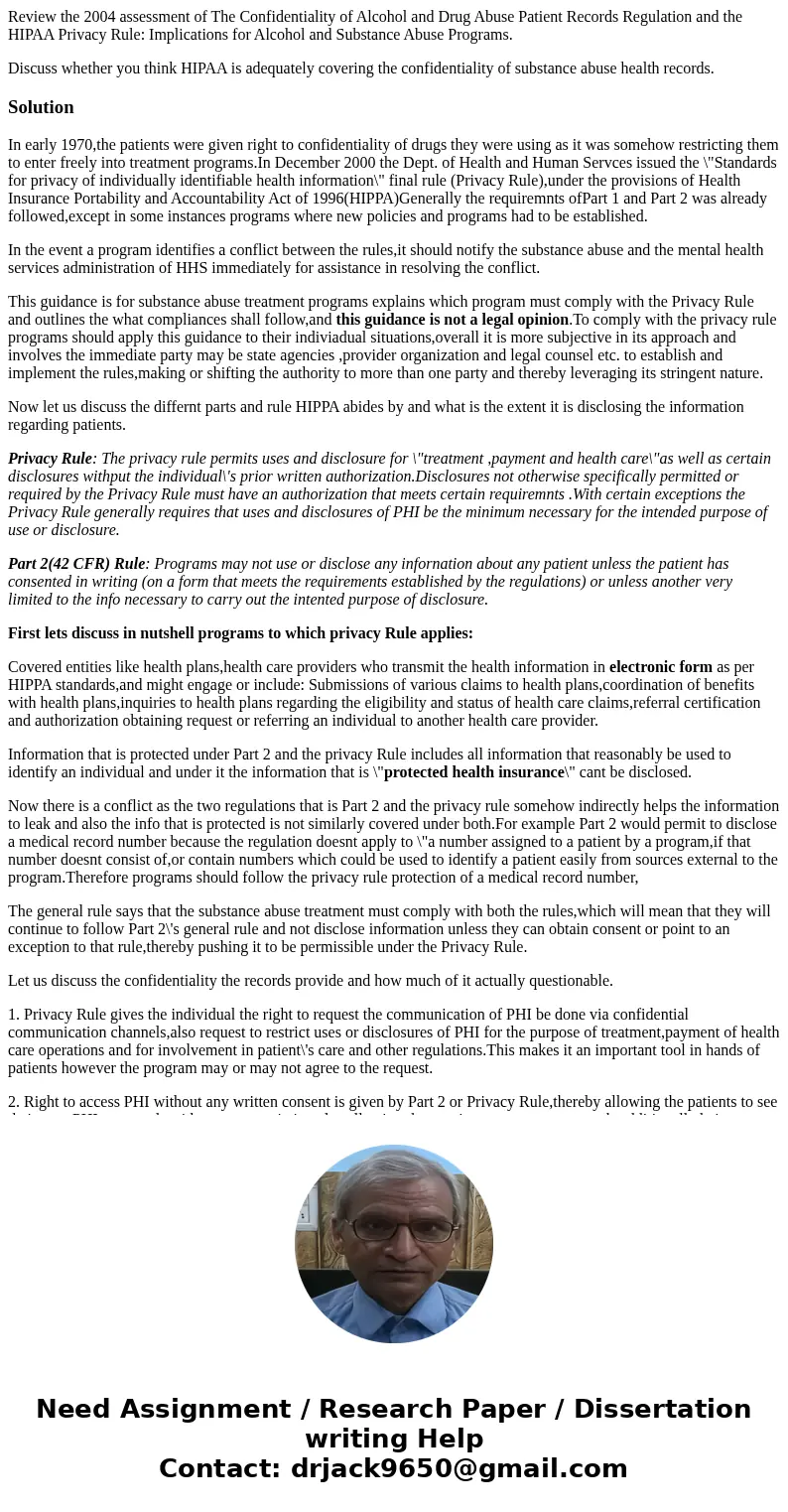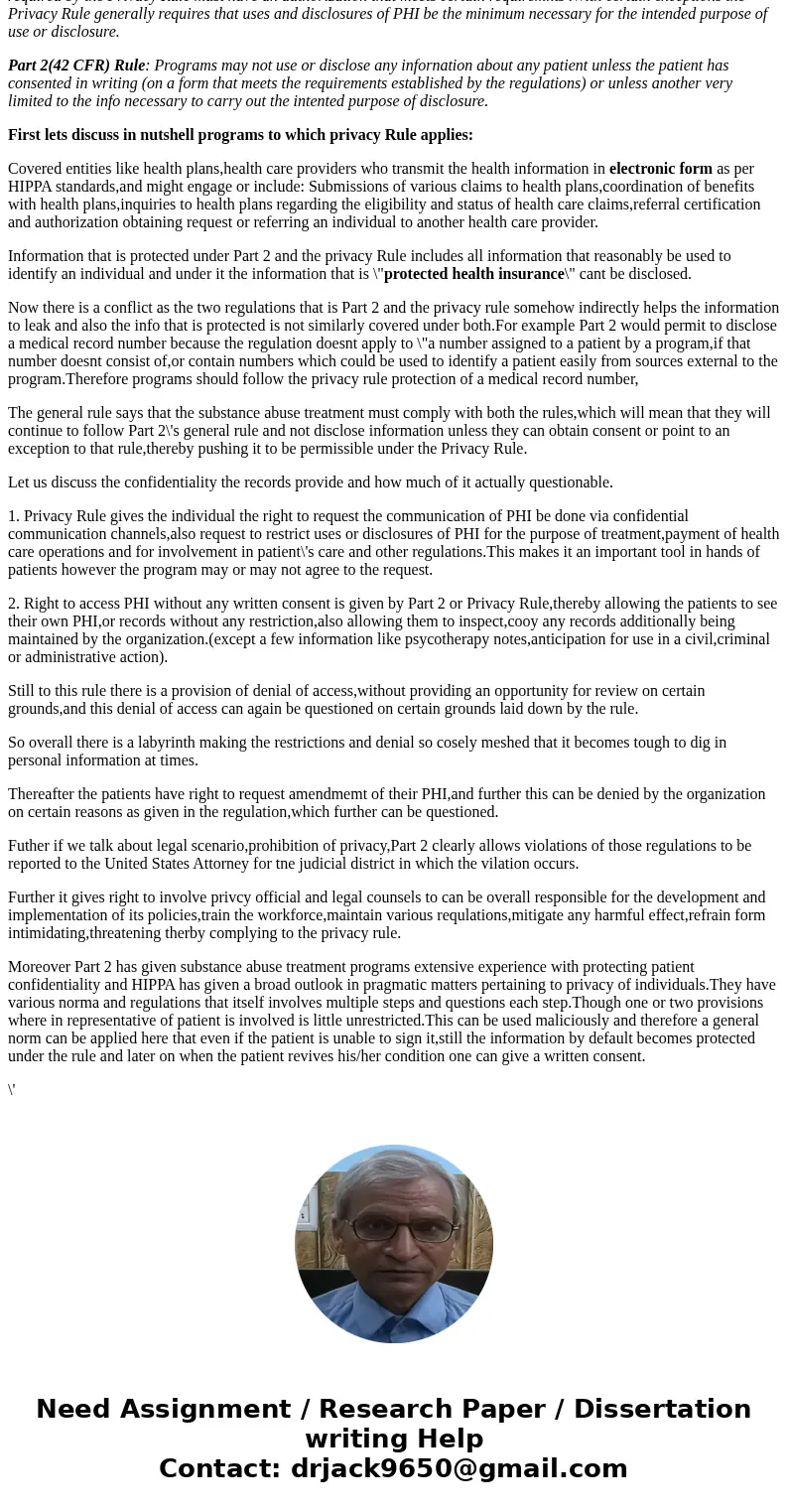Review the 2004 assessment of The Confidentiality of Alcohol
Review the 2004 assessment of The Confidentiality of Alcohol and Drug Abuse Patient Records Regulation and the HIPAA Privacy Rule: Implications for Alcohol and Substance Abuse Programs.
Discuss whether you think HIPAA is adequately covering the confidentiality of substance abuse health records.
Solution
In early 1970,the patients were given right to confidentiality of drugs they were using as it was somehow restricting them to enter freely into treatment programs.In December 2000 the Dept. of Health and Human Servces issued the \"Standards for privacy of individually identifiable health information\" final rule (Privacy Rule),under the provisions of Health Insurance Portability and Accountability Act of 1996(HIPPA)Generally the requiremnts ofPart 1 and Part 2 was already followed,except in some instances programs where new policies and programs had to be established.
In the event a program identifies a conflict between the rules,it should notify the substance abuse and the mental health services administration of HHS immediately for assistance in resolving the conflict.
This guidance is for substance abuse treatment programs explains which program must comply with the Privacy Rule and outlines the what compliances shall follow,and this guidance is not a legal opinion.To comply with the privacy rule programs should apply this guidance to their indiviadual situations,overall it is more subjective in its approach and involves the immediate party may be state agencies ,provider organization and legal counsel etc. to establish and implement the rules,making or shifting the authority to more than one party and thereby leveraging its stringent nature.
Now let us discuss the differnt parts and rule HIPPA abides by and what is the extent it is disclosing the information regarding patients.
Privacy Rule: The privacy rule permits uses and disclosure for \"treatment ,payment and health care\"as well as certain disclosures withput the individual\'s prior written authorization.Disclosures not otherwise specifically permitted or required by the Privacy Rule must have an authorization that meets certain requiremnts .With certain exceptions the Privacy Rule generally requires that uses and disclosures of PHI be the minimum necessary for the intended purpose of use or disclosure.
Part 2(42 CFR) Rule: Programs may not use or disclose any infornation about any patient unless the patient has consented in writing (on a form that meets the requirements established by the regulations) or unless another very limited to the info necessary to carry out the intented purpose of disclosure.
First lets discuss in nutshell programs to which privacy Rule applies:
Covered entities like health plans,health care providers who transmit the health information in electronic form as per HIPPA standards,and might engage or include: Submissions of various claims to health plans,coordination of benefits with health plans,inquiries to health plans regarding the eligibility and status of health care claims,referral certification and authorization obtaining request or referring an individual to another health care provider.
Information that is protected under Part 2 and the privacy Rule includes all information that reasonably be used to identify an individual and under it the information that is \"protected health insurance\" cant be disclosed.
Now there is a conflict as the two regulations that is Part 2 and the privacy rule somehow indirectly helps the information to leak and also the info that is protected is not similarly covered under both.For example Part 2 would permit to disclose a medical record number because the regulation doesnt apply to \"a number assigned to a patient by a program,if that number doesnt consist of,or contain numbers which could be used to identify a patient easily from sources external to the program.Therefore programs should follow the privacy rule protection of a medical record number,
The general rule says that the substance abuse treatment must comply with both the rules,which will mean that they will continue to follow Part 2\'s general rule and not disclose information unless they can obtain consent or point to an exception to that rule,thereby pushing it to be permissible under the Privacy Rule.
Let us discuss the confidentiality the records provide and how much of it actually questionable.
1. Privacy Rule gives the individual the right to request the communication of PHI be done via confidential communication channels,also request to restrict uses or disclosures of PHI for the purpose of treatment,payment of health care operations and for involvement in patient\'s care and other regulations.This makes it an important tool in hands of patients however the program may or may not agree to the request.
2. Right to access PHI without any written consent is given by Part 2 or Privacy Rule,thereby allowing the patients to see their own PHI,or records without any restriction,also allowing them to inspect,cooy any records additionally being maintained by the organization.(except a few information like psycotherapy notes,anticipation for use in a civil,criminal or administrative action).
Still to this rule there is a provision of denial of access,without providing an opportunity for review on certain grounds,and this denial of access can again be questioned on certain grounds laid down by the rule.
So overall there is a labyrinth making the restrictions and denial so cosely meshed that it becomes tough to dig in personal information at times.
Thereafter the patients have right to request amendmemt of their PHI,and further this can be denied by the organization on certain reasons as given in the regulation,which further can be questioned.
Futher if we talk about legal scenario,prohibition of privacy,Part 2 clearly allows violations of those regulations to be reported to the United States Attorney for tne judicial district in which the vilation occurs.
Further it gives right to involve privcy official and legal counsels to can be overall responsible for the development and implementation of its policies,train the workforce,maintain various requlations,mitigate any harmful effect,refrain form intimidating,threatening therby complying to the privacy rule.
Moreover Part 2 has given substance abuse treatment programs extensive experience with protecting patient confidentiality and HIPPA has given a broad outlook in pragmatic matters pertaining to privacy of individuals.They have various norma and regulations that itself involves multiple steps and questions each step.Though one or two provisions where in representative of patient is involved is little unrestricted.This can be used maliciously and therefore a general norm can be applied here that even if the patient is unable to sign it,still the information by default becomes protected under the rule and later on when the patient revives his/her condition one can give a written consent.
\'


 Homework Sourse
Homework Sourse